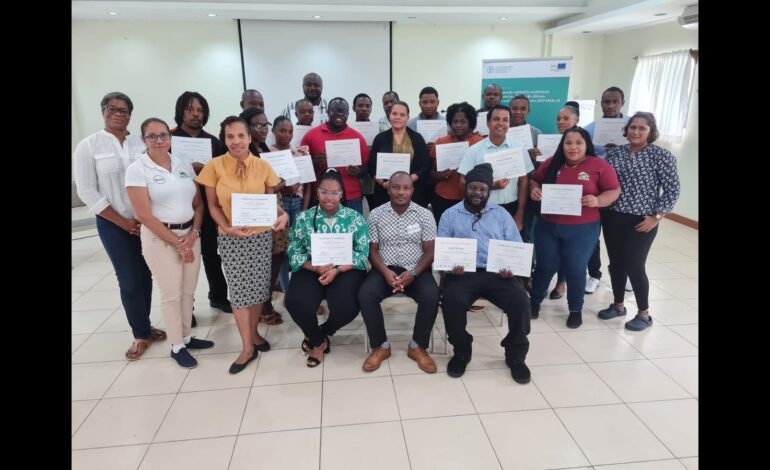
Twenty-two officers are now equipped to help farmers adopt more ecosystem-friendly agricultural practices
18 July 2023 – Castries, Saint Lucia – Twenty-two agricultural extension officers from Antigua and Barbuda, Dominica, Grenada, Saint Kitts and Nevis, Saint Lucia, and Saint Vincent and the Grenadines successfully completed a week-long training in the Farmer Field School (FFS) methodology held in Union, Saint Lucia from June 12 to 16, 2023. The Food and Agriculture Organization of the United Nations (FAO) and the Saint Lucia Ministry of Agriculture, Fisheries, Food Security and Rural Development hosted the training, which was funded by the European Union through the Programme for Capacity Building Related to Multilateral Environmental Agreements in ACP Countries Phase III (ACP MEAs 3). The training will assist farmers in adopting more sustainable and ecosystem-friendly agricultural practices.
For many of the participants, it was their first exposure to the FFS approach, which is grounded in experiential, group-based learning that responds directly to farmers’ needs and challenges. The extension officers gained knowledge of the FFS guiding principles, the qualities of a skilled facilitator, and how to control group dynamics for efficient participatory learning during the program. They also learned about the administrative aspects of FFS management through practical projects that gave them the chance to develop FFS implementation plans, including objectives, schedules, budgets, and milestones. A people-centred approach to teaching the material included group work, skits, case studies, and peer review.
One of the highlights during the training was the hands-on, field-based exercise which allowed the participants to familiarise themselves with the process of agroecosystem analysis, a technique in which farmers are guided to observe their farms closely, map them in detail, and analyze the resulting information to make decisions about what management practices to apply. This activity as FFS Master Trainer, Bertland Bates explained, gave officers the concrete experience that is a central element of the FFS method.
Saint Lucia’s Acting Chief Extension Officer, Eloi Alexis, welcomed the capacity-building, especially for young extension officers who were exposed to the FFS method for the first time. “It will help sharpen officers’ skills in organizing and managing farmer field schools. A new cohort of extension officers will be equipped with the skill set to become FFS facilitators.”
Eva Doxilly, an Agricultural Extension Officer from Saint Lucia, expressed her appreciation for the learning opportunity and described how it will be useful to her work: “I am now able to facilitate and create an entire farmer field school. I have a better understanding of adult learning using the discovery learning process, and I learned techniques that can be used to make farmer training more interactive and effective.”
Meanwhile, Delroy Williams, Agricultural Officer from Dominica wholeheartedly agreed, with the comments from the extension officers stating, “It was great to formalize an approach that I had previously been exposed to but never had an opportunity to lead. This training further developed my capacity, and I know that it has equipped me with the necessary tools to successfully implement an FFS in Dominica and to also support my colleagues there and in the Eastern Caribbean should a need arise. It was a wonderful experience to share and learn in this setting.”
“With its focus on in-field participatory learning that promotes autonomous problem solving, this training on FFS planning and facilitation is a timely intervention that is expected to contribute long-term change and drive meaningful transformation towards sustainable agriculture,” said ACP MEAs Project coordinator in Saint Lucia, Leshan Monrose.
The ACP MEAs 3 project has previously supported the update of Saint Lucia’s Farmers Field School manual and is currently assisting the Extension and Advisory Services Division in organizing farmer field schools in the north and south of the island. The focus of the field schools will be to promote eco-system-friendly agricultural practices particularly integrated pesticide management on two crops for which there is a pattern of heavy pesticide usage; tomatoes and cabbages. Eloi Alexis stated that he expects the upcoming field schools to “engender a renewed mindset in terms of protection of agrifood systems and the environment, through minimization of the use of harmful pesticides.” The FFS will also incorporate special outreach to young people studying agriculture at the Sir Arthur Lewis Community College, to introduce them to the method and its benefits.
FAO will continue to work with the cohort of extension officers who were trained in Saint Lucia under the ACP MEAs 3 project, further sharpening their skills to support farmer education and empowerment. Through its consistent support to Saint Lucia and other Caribbean countries, FAO is working to embed FFS and its learning-by-doing approach in agricultural extension delivery across the region.






